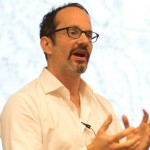
Tony Hyman is a Director and Group Leader at the Max Planck Institute of Molecular Cell Biology and Genetics (MPI-CBG) in Dresden, Germany. In 1984 he received his BSc first class in Zoology from the University College in London. From 1985 to 1987 he wrote his PhD on “The establishment of division axes in early C.elegans embryos” under the supervision of Dr. John White at the Laboratory of Molecular Biology, MRC in Cambridge, England.
From 1988-1992 he carried out his postdoctoral research as a Lucille P. Markey Senior Fellow in the lab of Prof. Tim Mitchison at UCSF, investigating the mechanism of chromosome movement with in vitro approaches. In 1993 he became a Group Leader at the European Molecular Biology Laboratory in Heidelberg, before he moved to Dresden in 1999 as one of the founding directors of the Max Planck Institute of Molecular Cell Biology and Genetics (MPI-CBG). He was Managing Director of the MPI-CBG from 2010-2013. He has been a member of ASCB since 1996 and EMBO since 2000. In 2002,
Hyman was named honorary Professor of Molecular Cell Biology at the Technical University Dresden. He was awarded the EMBO Gold Medal in 2003, was elected as a Fellow of the Royal Society in 2007, and was elected to the Academia Europaea in 2014. In 2011, Hyman was awarded the most important research award in Germany, the Gottfried Wilhelm Leibniz Prize.
The Hyman lab has an international reputation in centrosome function, spindle assembly and microtubule dynamics, as well as more generally in organization of cytoplasm. His recent work on liquid phase separation in cytoplasm suggests a novel way to organize biochemical machinery into non-membrane bound compartments, which is having a wide influence in a number of aspects of cell biology.
Hyman supports open access, and he was involved in setting up the journal eLife, as the Max Planck representative in hiring the managing editor. He is currently a reviewing editor for the journal. He is active in advising other institutes through his chairmanship of the boards of IMBA in Vienna and the NNF in Copenhagen, and is also a member of a number of other advisory and editorial boards. Hyman is committed to international exchange in cell biology and was elected to the ASCB Council in 2014 with the goal of promoting innovation and easy exchange of information between the European and American scientific communities. He has written commentaries on these topics, including “Funding Innovative Science” (Science, 2013), and “Encouraging innovation” (Molecular Biology of the Cell, 2014).
Return to main Steering Committee Bios page >>
